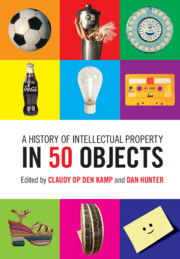Book contents
- Frontmatter
- Dedication
- Contents
- Acknowledgments
- Introduction: Of People, Places, and Parlance
- The Pre-Modern Period
- The Age of invention
- 5 Hogarth Engraving
- 6 Lithograph
- 7 Morse Telegraph
- 8 Singer Sewing Machine
- 9 Uncle Tom's Cabin
- 10 Corset
- 11 A.G. Bell Telephone
- 12 Light Bulb
- 13 Oscar Wilde Portrait
- 14 Kodak Camera
- 15 Kinetoscope
- 16 Deerstalker Hat
- 17 Paper Print
- Modern Times
- The Consumption Age
- The Digital Now
- About The Contributors
17 - Paper Print
from The Age of invention
Published online by Cambridge University Press: 12 June 2019
- Frontmatter
- Dedication
- Contents
- Acknowledgments
- Introduction: Of People, Places, and Parlance
- The Pre-Modern Period
- The Age of invention
- 5 Hogarth Engraving
- 6 Lithograph
- 7 Morse Telegraph
- 8 Singer Sewing Machine
- 9 Uncle Tom's Cabin
- 10 Corset
- 11 A.G. Bell Telephone
- 12 Light Bulb
- 13 Oscar Wilde Portrait
- 14 Kodak Camera
- 15 Kinetoscope
- 16 Deerstalker Hat
- 17 Paper Print
- Modern Times
- The Consumption Age
- The Digital Now
- About The Contributors
Summary
DEAR AINSWORTH,
You don't know me. I am writing to you from 125 years in the future and I would like to thank you. I have long felt the need to thank someone. You might not even realize what you've done, and you certainly might not understand the magnitude of the consequences of what might have been a fleeting decision.
It's strange. Often you don't register the important moments in your life as they happen. Only when you look back do you see that they were important. How certain moments were clearly an ending, and how others were the beginning of something. The shadow line, Joseph Conrad called it, that line you know you've crossed only after you've crossed it and can look back over it. Like the invisible line between adolescence and adulthood. Like the equator. And in your case, like the invention of cinema. It's hard for us to imagine now, but it took a while to figure out what cinema was. Was the new invention an extension of an existing medium or was it something different? The 20-year period between 1893 and 1912 now marks that shadow line. In 1864, you were 49 years old when Abraham Lincoln appointed you the 6th Librarian of Congress. You also acted as the Register of Copyrights—not by title but in practice, as that job had not yet been made a formal position.
By advocating for the passage of the Copyright Law of 1870, you made it your quest to move all US Copyright activities that were once dispersed among the Smithsonian Institution and the Patent Office to the Library of Congress. The new law required all Copyright applicants to send the Library two copies of their work. You argued that if both copies were mailed directly to Washington fresh off the press, instead of having to go through their authors’ District Courts, the labor involved would be cut by half. You also argued that having copyright records readily available where their related publications are stored would simplify and facilitate reference to the utmost degree. The number, too, of copyright publications issued in the United States would now be known, and such a precise accounting would prevent copyrights from being invalidated.
- Type
- Chapter
- Information
- A History of Intellectual Property in 50 Objects , pp. 144 - 151Publisher: Cambridge University PressPrint publication year: 2019



